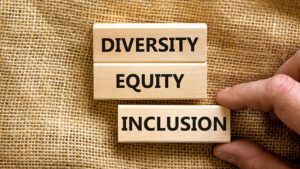Digital options for voting in AGMs and engaging in banking services can broaden participation in those areas, and help companies work towards the UN sustainable development goal (SDG) of financial inclusion.
Sustainable development goal 8 explicitly targets financial inclusion – measured by the number of ATMs accessible to the public, and the proportion of adults holding accounts at financial institutions and mobile providers – but financial inclusion is a key enabler of impact across a range of SDGs.
Sophie Demaré, ESG & engagement associate at Federated Hermes, said the banking and telecommunications sectors are uniquely positioned to positively impact socioeconomic wellbeing and target UN sustainable development goals.
Demaré said: “A bank account is a vital means to achieving the outcomes of a broad array of the UN SDGs, acting as a lifeline in times of crisis and a vehicle for social mobility.”
However, according to data published by the World Bank this year, 1.4 billion adults remain excluded from the global financial system today.
The poorest tend to be worst affected, due to a lack of access in rural areas, cost barriers faced by banks for issuing smaller loans, and insufficient education among customers in personal budgets and finance.
Impoverished households rely heavily on cash and physical assets, such as livestock, for any financial stability. During health emergencies or natural disasters they lack a buffer to maintain their livelihoods.
Without access to capital they also struggle to get out of poverty by starting a business, taking on education, or moving to access superior employment.
Mobile banking
Mobile banking provides a solution – two thirds of unbanked adults own a mobile phone, and in many places digital financial services have stepped in to provide resources traditionally offered in brick-and-mortar banks, via digital channels tailored to those with mobile access.
A key ingredient is required to mobilise this: a mobile network connection.
In a virtual Campfire organised by Open Banking Excellence in January on the issue of open banking in Brazil, Luana Soratto, head of use cases for open finance at Brazilian payment app PicPay, said: “We are a developing country, and even before talking about the unbanked, we need to talk about the digitally excluded.
“It is very difficult for someone to be included in the financial system without being inserted in the digital environment. And that’s 15% of the population today”.
Banks are stepping up their commitments to expand customer bases to underserved groups. In 2021, 28 banks committed to set targets to make credit more accessible, increase financial literacy and combat over-indebtedness through the Principles for Responsible Banking’s Commitment to Financial Health and Inclusion.
Federated Hermes’ Demaré said: “Banks rely on telecommunications providers to expand connectivity into underserved areas of the world to better deliver on promises of financial inclusion, broadening their reach to more of the 2.3 billion people without internet access in 2021.”
In some cases, telecommunications firms are eliminating the need for a bank entirely by offering their own secure, trusted mobile money services, requiring only a mobile subscription to participate.
Demaré said: “We recognise the role of financial inclusion as a catalyst for progress on a wide range of SDGs, particularly for vulnerable members of society.
“To this end we regularly engage with banks and telecommunications firms to understand how financial inclusion can form a strategic and expansive element of their business strategies.”
Digital AGM voting
For those who have already gained a foothold into wealth creation, digitalisation can also help them engage more in the governance of the companies they invest in, further broadening financial inclusion.
Nearly nine in ten private investors in investment companies have rarely or never attended an annual general meeting (AGM), according to research from the Association of Investment Companies (AIC) this year.
The most common reason given for non-attendance was the inconvenience of travelling to AGMs, selected by 59% of those who said they never or rarely attend. Another reason cited was not having the time to attend (27%).
But nearly two-thirds (65%) of all respondents said they would be more likely to attend AGMs if there was an option to join them online.
Annabel Brodie-Smith, communications director of the AIC, said: “Along with voting, AGMs are a key way for shareholders to make their voices heard and exercise the democratic rights they have as investors in investment companies.
“Our research shows that the main reasons for not attending AGMs are practical ones – a reluctance to travel or spare the time – rather than just a lack of interest.”
Around a third of investment companies now offer an option to attend their AGM online to boost participation. The AIC website lists upcoming meetings for every member investment company, including AGMs and shareholder presentations.
With many platforms now offering their customers the ability to vote their shares online, 20% of respondents to the survey said they often vote their shares, 15% sometimes vote their shares, 25% do it rarely and 35% never.
